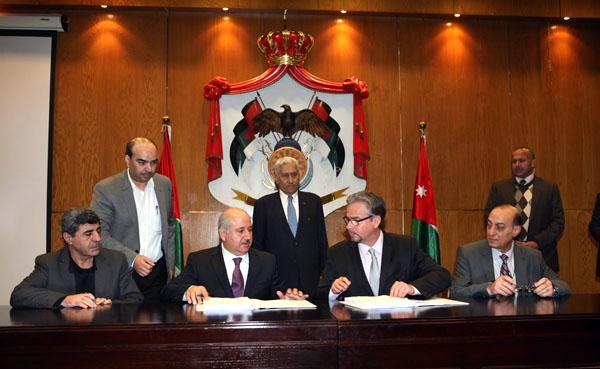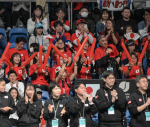You are here
Water Ministry launches supply strategy for northern governorates
By Dana Al Emam - Dec 02,2015 - Last updated at Dec 02,2015

Water Minister Hazem Nasser signs a project agreement with the French Development Agency in the presence of Prime Minister Abdullah Ensour on Wednesday (Petra photo)
AMMAN — The Water Ministry on Wednesday launched its water supply strategy for the northern governorates until 2028, including eight projects expected to cost $305 million.
The strategy, which will be in full implementation by the end of 2017, entails providing the Irbid, Jerash, Ajloun and Mafraq governorates with 50 million cubic metres of fresh water annually, in addition to rehabilitating water networks in Irbid, Jerash and Ajloun.
Speaking at the launch, Prime Minister Abdullah Ensour said the strategy’s projects are an “important contribution” to decreasing chronic water shortages.
Water scarcity has deepened in the past few years due to the presence of some 1.4 million Syrians in the country.
Jordan has succeeded in overcoming the region’s political and economic crises, the premier said, highlighting the need to continue improving the economic environment to further develop the national economy.
Ensour cited the strategy as part of the government’s “ongoing” efforts to serve Jordanians across the country, noting that the government has spent over JD1.2 billion on water projects over the past three years.
Water Minister Hazem Nasser said the strategy aims to facilitate transporting water from southern to northern areas, citing a 40 per cent increase in demand in the north, as it hosts a large number of Syrian refugees.
The eight projects of the strategy will enhance water supply in the target region and increase the utilisation of surface water in winter instead of excessive pumping of groundwater.
The first project will connect the capital’s Abu Alanda Reservoir to the Khaw Reservoir in Zarqa Governorate, at a cost of $46 million, fully funded by the French Development Agency (AFD).
The project agreement was signed on Wednesday and implementation is scheduled to start before the end of this month.
The second project is a pipeline from the Khaw Reservoir to the Zaatari Reservoir in Mafraq Governorate at a cost of $25 million, 90 per cent of which is funded by the German Development Bank (KfW).
Another project funded by KfW, worth $15 million, will improve the pipeline connecting Wadi Al Aqeb aquifer in Mafraq to the Zaatari Reservoir. The three phases of this project are currently under construction and are expected to be finished in November 2016.
USAID’s current project, worth $50 million, connects the Zaatari Reservoir to Irbid’s Hofa Reservoir.
A Saudi-funded project worth $16 million will connect Um Lulu station in Mafraq to Jerash Governorate and is expected to be operational in June 2016.
The sixth project, expected to finish in June 2016, connects Hofa Reservoir in Irbid to Ajloun Governorate. It is worth $20 million and fully funded by the Saudi Development Fund.
The Japan International Cooperation Agency has financed a $25 million project currently under construction to connect Hofa Reservoir to Beit Ras in Irbid, which will be operational in November 2016.
The strategy’s final project is the second phase of Wadi Al Arab Water Conveyance Project, worth $108 million and co-funded by the European Investment Bank, AFD and the EU.
Contractors will be invited to submit their technical and financial proposals before the end of December.
Ensour and Nasser commended donors’ support in enabling the strategy.
Speaking on behalf of the donors, French Ambassador to Jordan David Bertolotti praised the Kingdom’s success in addressing short-term responsibilities without losing sight of long-term objectives, citing the strategy as the beginning of cooperation in the water sector.
Related Articles
Construction commenced on Saturday on two main water conveyors for Ajloun and Jerash governorates to address water shortages due to the growing population in the northern region, officials said on Saturday.
Construction work commenced on Monday on two main carriers to convey water from the Disi Water Conveyance Project to the northern governorates, according to the Ministry of Water and Irrigation.
AMMAN — Water supply in the northern governorates of Jerash and Ajloun is expected to increase this summer, as the National Water Carrier pr
















